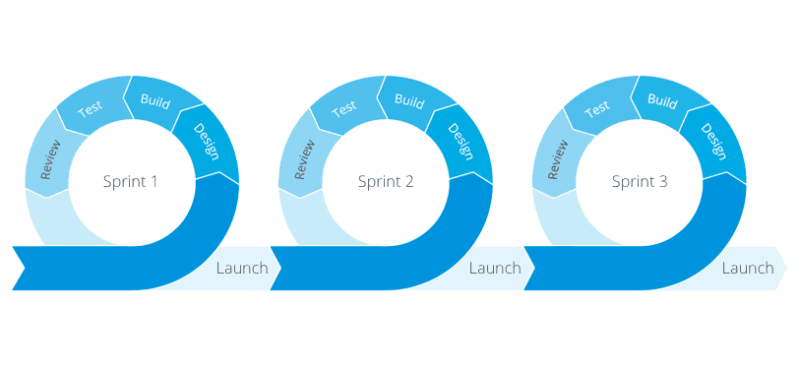01 February 2019
Why do you need the Project Manager in Agile? The role of the PM in the software development project

In the article below, I’ll try to present you the role of the Project Manager in Agile. It happens that CTO of the company which needs to outsource the project thinks that he’s capable of managing the project and the whole external team on his own. But is he? Recently, we’ve published an article on some tricks of a Project Manager to improve your work with developers.
Have you ever wondered if a project manager can take your project to the next level? Today, I will try to explain why actually you and your project need the experienced PM.
What is Agile?
Before I start with the role of Project Manager in Agile – it’s worth defining what exactly Agile is. Is it some kind of black magic which can help you manage the project very well? Or maybe the ancient guideline written down on a rock – with some tips on how to develop a product to meet the client’s requirements? Well… almost – but it’s not “that ancient” and definitely not written on a rock.
- Agile is A WAY to develop a product, not a method to manage a project. It’s about creating a product in short iterations, so-called “sprints”.
This method is focused on delivering a few smaller parts of the product at a time, instead of trying to develop the whole application at once. Thanks to this, developers can react quickly to all the circumstances – such as business’ requirements or client’s comments – on a daily basis.

Then, why Agile cannot be considered a way of managing the project? Because most of the things – a starting point, some milestones, and the final goals, the budget and team members – are set in the very beginning of the project, before the actual software development starts. After that, nothing (besides, maybe, the team squad) should change, as the advertising campaign of the product is on. Therefore, you simply can’t change the core of the plan from sprint to sprint. So, why do you actually need the Project Manager in an Agile project?
I’ll start with what’s most familiar to me. What’s the role of the Project Manager in The Software House?
In fact, in TSH, PMs are responsible for being: Scrum Master, Product Owner, Sales Specialist and Sponsor/Account Manager.
In the article, I’ll focus on the first two roles – Scrum Master and Product Owner – in relation to Agile.
Project Manager vs. Scrum Master and Product Owner
Let’s start with defining what Scrum Master and Product Owner mean. The first is not the martial arts master. It’s a person who works close to the team and tries to teach them how to operate in Scrum. Even though normally he cares about a team, Scrum Master doesn’t have a direct impact on the final product. Product Owner is the opposite of Scrum Master – a person who doesn’t work close to the team but has the biggest impact on the final product. He has to write down a backlog and talk to the stakeholders about a project’s future.
See also: The Software House – one of the top development companies in Poland
So, you know what are the duties of Product Owner and Scrum Master and the differences between them. Now, let’s talk about the Project Manager – where’s a place for him in a project?
- First and foremost, he needs to manage a team in a way to deliver the best product possible. Also, it’s his role to make sure stakeholders are happy with the final results.
In other words – PM is playing a role of both the Scrum Master and the Product Owner. However, sometimes, he needs to do even more. It happens that the PM is managing the project budget and the development process to make sure everything is delivered before the deadline.
Why do you need PM in Agile?
Majority of our clients decide to hire a full team for their projects. They want the team to develop a project in line with their requirements. But the team normally needs the mentor – a person who can supervise a project to make sure it’s progressing swiftly. His task is to take the role of the Product Owner to write down a proper backlog. Personally, I recommend doing it with the team, it can make the backlog clear and the team can prepare better.
Sometimes, PM needs to become Scrum Master to supervise the work progress. He needs to analyse the process and implement changes to make people feel comfortable and the project more efficient.
PM is responsible for pleasing clients and for overcoming all the obstacles throughout the project.
As one person works close to the team and makes sure that the client is satisfied, you can avoid a major issue of the relationship – communication. It’s important for the PM to update both the team and the client about all the changes. If you have any communication issues in your team, the whole project will go wrong.
Does PM need technical skills?
It’s not necessary, but definitely good for the PM to have some technical skills. Especially if they’re taking part in the meetings during which developers are talking to each other using the tech jargon so the PM doesn’t understand a single word. Here’s a list of the main skill every PM should have according to PMI:
- leadership,
- team building,
- motivation,
- communication,
- influencing,
- decision making,
- political and cultural awareness,
- negotiation,
- trust building,
- conflict management,
- coaching.
That’s quite a long list of requirements, isn’t it?
So, is there really a need for Project Manager in Agile?
The answer is: definitely. But it’s very important to set their responsibilities clearly.
Also, it’s crucial to make sure that PM’s duties are set accordingly to the project requirements and not the other way round.
(The same goes for the tools – you should choose those which can help you with achieving the business goals; never adapt the whole project to your tool set.) Merging a few positions, which is the essence of being the Project Manager, is a good thing, but it’s also necessary to remember that sometimes taking over too many tasks can lead to some serious problems.
However, if you happen to find an experienced Project Manager, he may be the key to your project’s success.
Have you wondered what it's like to work with experienced Project Managers?
Check out our current job listings! 👇

